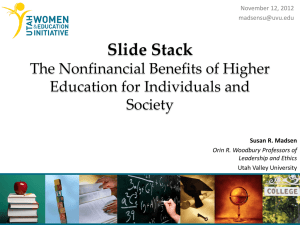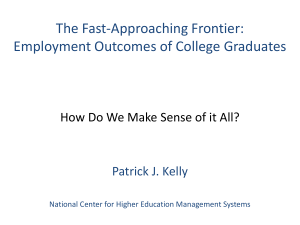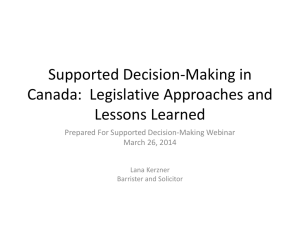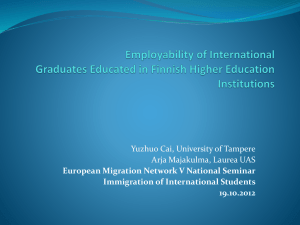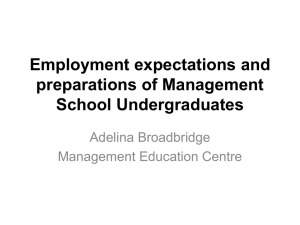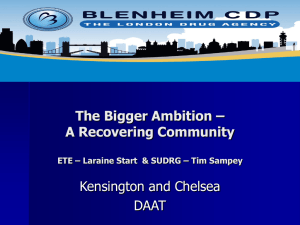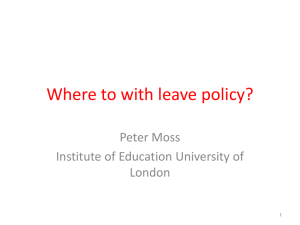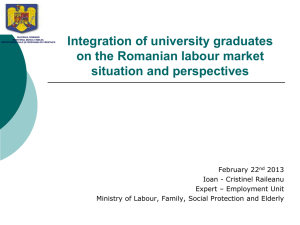Fathers Inside
advertisement
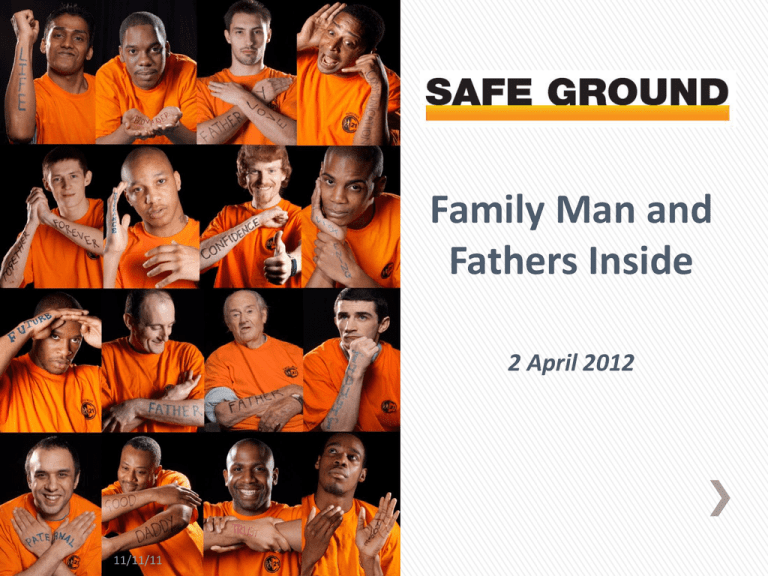
Family Man and Fathers Inside 2 April 2012 11/11/11 Family Man • 7-week programme • Focus on maintaining and developing family relationships • Considering impact of imprisonment on the whole family Fathers Inside • 5-week programme • Focus on parenting • Considering impact of imprisonment on children and their carers • • • • Family Man Personal development Considering the needs of family members How to be an active family member from prison Making realistic plans for the future • • • • Fathers Inside Understanding child development The needs of children How to be an effective father from prison Contributing to their children’s education • • • • • • • • Warm Up Games Fiction Drama Group and One-to-One Discussion Portfolio Work Debates Letter Writing Presentations A Supporter* can be a: • • • • Partner Relative Friend Volunteer *Family Man only • • • • What’s Involved? Receiving and replying to 4 structured letters Attending a Supporters’ only session Working face-to-face with the FM student Attending a Family Visit, which includes a Presentation Family Man • Student and Supporter meet internal and external agencies • Student and Supporter work together to write a Family Action Plan • Opportunity to work with OM/OS Fathers Inside • Student meets internal and external agencies • Student writes an Action Plan to help him meet his needs as a father • Opportunity to work with OM/OS Family Man Fathers Inside NOCN Qualifications in: NOCN Qualifications in: • • • • • Family Relationships, Level 1 Developing Group and Teamwork Communication Skills, Level 1 Developing Personal Development Skills, Level 1* *If all 3 units are achieved, the student will also receive a Level 1 Award for Progression Other Assessment Opportunities: • Opportunities to practice for Functional Skills in English Developing Parenting Skills, Level 1 Developing Group and Teamwork Communication Skills, Level 1 Other Assessment Opportunities: • • Adult Literacy, Entry Level Opportunities to practice for Functional Skills in English Family Man • 2 full-time tutors • 1 Family Support Worker (FSW) @25 days • 1 Family Man Line Manager @2.5 hours per week Fathers Inside • 2 full-time tutors • 1 Family Support Worker (FSW) @15 days • 1 Fathers Inside Line Manager @2 hours per week • • Additional staff to supervise ‘What Next’ session and Presentation Additional staff to supervise ‘What Next’ session and Presentation • Coordinating security clearances for Supporters and Family Visit guests • Liaising with Supporters via phone and letter • Co-facilitating the Supporters’ Only session (FM only) • Organising the ‘What Next’ session • Following up referrals from the ‘What Next’ session • Organising Family Visit • Offering post-course referrals for Supporters Since 2003: 391 FM/FI courses in 45 Establishments 4,557 Graduates receiving 10,537 qualifications Post-course data collection forms measure: • • • Course completion rates Progression to education, training and employment Families accessing agency support at ‘What Next’ session Course Completion Rates 2011-12 80% Students engaged in Education, Training and Employment: 2010-11 100% 90% 2010-11 77% 2009-10 75% 2008-09 74% 80% 70% 60% 50% 40% 30% Students engaged in ETE precourse Students engaged in ETE postcourse 2011-12: 97% of families have 20% 10% accessed support and advice 0% from What Next agencies (e.g. All Fathers Original Revised Programmes Inside Family Man Family Man Sure Start, Job Centre Plus, Nacro, PACT, CARAT, education, housing Since 2007… and community services) • Students engaged in ETE before FM/FI = 69.4% • Students engaged in ETE after FM/FI = 92.4% Over the past decade we have compiled a significant body of evidence demonstrating our programmes’ impact, including: • • • • 7 independent evaluations 5 independent reviews Participation in wider research studies On-going data collection and analysis Family Man Review 2007-08 (University of East Anglia) Tracked reoffending outcomes for 211 Graduates released from HMP Wandsworth 2005-07 using LIDS data. • FM Graduates reconviction rate = 19.6% • 2004 national prisoner reconviction rate = 56% • BUT: No control group and unable to track reoffending outcomes over the long-term Tracked adjudications received by Students to assess impact on behaviour on the wing. Men with Adjudications in 6 Months Before Course Men with Adjudications in 6 Months After Course 0% 10% 20% 30% 40% Independent Evaluation completed by Boswell Research Fellows and the University of East Anglia • Assessed longer-term impact of the revised Family Man programme upon Graduates and Supporters (2008-10) from 7 establishments • Analysis of questionnaires completed by 54 Graduates and 50 Supporters • In-depth interviews were conducted with 24 Graduates (including 6 who had been released) and 24 Supporters Key findings: 78% of Graduates reported implementing the goals in their FM Action Plan 84% of Graduates reported improved relationships with their children/families 92% of Supporters agreed that FM had helped their graduate understand his family responsibilities 98% of Supporters felt that FM had helped both of them think about resettlement None of the released Graduates surveyed or interviewed appeared to have reoffended 2011-2013 DfE funded longitudinal study of Family Man Conducted by the Institute for Criminal Policy Research, University of London Biggest study to date Will use official data, including reoffending rates, adjudications and family visits, on all Graduates since 2007 to assess longer-term impact of FM Surveying and interviewing Students and Family Supporters to measure changes in perceptions and family relationships in line with Desistance theory Will survey education staff and officers to assess impact on the regime Provide a comprehensive cost-benefit analysis to examine the programme’s cost-effectiveness




